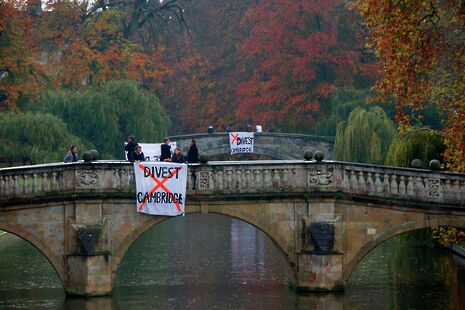The unethical investments of some Cambridge colleges must go
Responding to the findings of an investigation into the investments of Oxbridge colleges, Beth Bhargava argues that the time for complicity is over

Investigations into the finances of Oxbridge colleges have revealed the devastating extent of their investments in the arms and fossil fuel industries. In total, Cambridge colleges invest just over £70 million in offshore funds, including some with links to oil and gas exploration.
To cite just one example, Cambridge’s biggest investor, Trinity College, currently has £9.1m directly invested in companies involved in oil and gas exploration, production, and refinement, and £7.79m invested in companies that carry out fracking.
These raw statistics allow us to observe the extent of the problem we face, but in order to appreciate the nature of this problem it is necessary that we drill down into the specifics of these investments, and look at those impacted on the ground.
For example, Trinity currently contributes £64k to the mining giant Freeport-McMoran. A New York Times piece published in 2005, about the company’s Grasberg mine in Indonesia – the world’s second-largest copper mine – described “a spreading soot-coloured bruise of almost a billion tons of mine waste that the New Orleans-based company has dumped directly into a jungle river of what had been one of the world’s last untouched landscapes.”
It is worth highlighting that the devastation of land and eco-systems inevitably causes hardship for those communities dependent upon these resources
This year, Bloomberg reported that the tailings from Freeport’s mine were being disposed “into a river, where they [made] their way downstream to be stored in a ‘cordoned of area′ since the 1990s.” At the time of the article’s publication, Freeport’s CEO Richard Adkerson said that this had had “no unexpected environmental consequences.”
These statistics do not just reflect an environmental disaster; they also have a social impact. Although it may seem to be stating the obvious, it is worth highlighting that the devastation of land and eco-systems inevitably causes hardship for those communities dependent upon these resources.
Together, seven Cambridge colleges out of those who responded to the requests for information have £4.6m of investments in Royal Dutch Shell, £2.4m in ExxonMobil, and £1.6m in BP. Each of these companies has faced intense public scrutiny for past oil spills, which have wreaked havoc on their surrounding environments, as well as local communities.
BP’s internationally condemned Deepwater Horizon oil spill has been estimated as the world’s largest accidental marine oil spill. It was said to have discharged approximately 4.9m barrels, as well as 500k tons of natural gas. In 2012, BP agreed to pay $4.5bn in fines, after pleading guilty to 14 criminal charges, including 11 of manslaughter following fatalities from the oil rig explosion. A US Department of Commerce report stated that the Deepwater Horizon oil spill killed thousands of marine mammals and sea turtles, and contaminated their habitats.
The 2011 Ogoniland report by the UN Environment Programme found that decades of oil spills in the Niger Delta by Shell had not yet been cleaned up.
Environments where unethical investments are centred are often tied to a history of human rights violations. In 1995, environmental activist Ken Saro-Wiwa, who campaigned against the degradation of Ogoniland, was executed by the Nigerian military, to international condemnation. Shell withdrew from the area in 1993, and has firmly denied complicity in these developments.
The findings of this investigation make me worry that the image Cambridge institutions present of ethical and social leadership is misleading, and that radical changes are needed to resolve the contradictions between rhetoric and reality.
The recent decision by Queens’ to fully divest from the fossil fuel industry stands out as a practical example of how this may be accomplished, and as a symbol of hope. Cambridge Zero Carbon’s campaign, which I’m a part of, will this year increasingly focus on the endowments of individual colleges as well as the university, and many campaigners are optimistic about its success.
If these investigations have shown anything, it is that colleges’ investments in the fossil fuel industry are merely symptomatic of a wider problem. College divestment campaigns represent a necessary first challenge to the persistence of these investment practices. This week’s revelations have made it eminently clear that the nature of colleges’ investments cannot be accepted by students or staff. We will work relentlessly, and together, in solidarity, we will transform them.
 News / Colleges charge different rents for the same Castle Street accommodation2 March 2026
News / Colleges charge different rents for the same Castle Street accommodation2 March 2026 News / King’s hosts open iftar for Ramadan3 March 2026
News / King’s hosts open iftar for Ramadan3 March 2026 Theatre / Lunatics and leisure centres 4 March 2026
Theatre / Lunatics and leisure centres 4 March 2026 News / Angela Merkel among Cambridge honorary degree nominees27 February 2026
News / Angela Merkel among Cambridge honorary degree nominees27 February 2026 News / News in Brief: waterworks, wine woes, and workplace wins 1 March 2026
News / News in Brief: waterworks, wine woes, and workplace wins 1 March 2026








